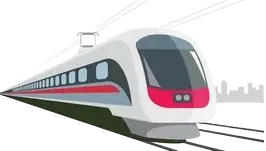Network Rail Signaller – Grade 2
Full TimeBookmark Details
Full job description
Be part of the team that enables our railway to run safely.
Solve problems and keep our passengers moving throughout the UK.
You will be based in Barrhill.
What is signalling?
Signaling is how we keep thousands of trains moving safely across our railway. By operating a sophisticated traffic light system and other specialist equipment, our signalers control the movement of trains across the network.
Without signalling, our railway wouldn’t function.
What does it involve?
As a signaler, you’ll need to react to changing situations, make quick decisions and stay calm under pressure. Every day, you’ll face new challenges, some of which you expect and others you don’t. This could be responding to an incident such as trespassers on the line; you could be taking a line blockage to allow track access for maintenance colleagues, or you could be communicating with a train driver about a problem they’ve encountered.
Whatever the situation you’re faced with, you’ll be able to apply your training and skills to manage it safely and get passengers moving and on their way to their destination.
Our signalers work a variety of shift patterns, including nights, evenings, weekends and bank holidays. There’s also lone-working and team-working. The responsibility of a safety-critical role isn’t for everyone, but you’ll finish the day knowing the work you’re doing has helped passengers reach their destinations safely.
Your Training Matters
Becoming a signaler is a big commitment and requires extensive training and a good amount of self-directed learning. We’ll support you with training to develop the technical and non-technical skills you’ll need to be successful.
This is 12-week Initial Signaler Training (IST), 10 of which is classroom learning, and location-specific training where you’ll learn on the job and practice your skills in a live environment before being signed-off as a fully competent signaler.
It’s important you’re actively committed to your training and personal development. All signalers have an ongoing cycle of competence assessments to help keep their skills up-to-date, but also to help support professional development and career progression.
Each day as a signaler is rewarding. Your decision-making skills will make all the difference to the safety of our passengers and colleagues.
Is it right for you?
You don’t need any specific experience to start a career in signalling. It’s more important that you’ve got the right transferable skills and behaviours. Here are the key non-technical skills that matter in signalling.
Conscientious: You’re able to work diligently, deliver high-quality work through following procedures, and be willing to take responsibility for your actions. You’ll work in accordance with the standards by taking a systematic and thorough approach to what you do without the need for constant supervision.
Attention Management: You’ll be able to remain alert and focused, manage distractions, and keep an awareness of the overall situation.
Workload Management: You’ll be able to prioritise demands, analyze information coming from a number of sources, carry out multiple tasks quickly, sometimes at the same time and switch your attention between tasks and sources.
Working with Others: You can build key relationships with people internal and external to Network Rail, enabling us to work together to get the job done safely and effectively.
Controlled Under Pressure: You’ll be able to think in a controlled manner under pressure, effectively dealing with stressors and adapting to changeable conditions.
Decision Making: You can make risk-based decisions in a timely fashion to maintain a safe and efficient running railway.
Communications: You’ll need to be able to communicate clearly and concisely, both verbally and in written format, and to be confident in standing your ground. Clear communication between different people on the railway is essential for the safe running of our railway and to ensure that all parties have a shared understanding of what is going on.
Willingness and Ability to Learn You’ll be motivated to develop yourself by retaining, applying and sharing knowledge and skills. It’s about the drive to maintain and develop your own skills, recognising that there are always opportunities for improvement, and being willing to consider new ways of doing things.
Safety matters We’re committed to keeping our tracks, staff, and passengers safe, so it’s important that you’re always alert when you’re working as a signaler. To help manage fatigue, you must live within a 50-minute commute of your chosen location, including having access to your own means of transport. When you apply, you’ll be asked to confirm that you are able to commute to your chosen location, whether by car, bike or foot, in under 50 minutes.
If successful, you will be required to undergo and pass a drug and alcohol test. All positive drugs and alcohol test results for prospective candidates will be securely held on Sentinel database and subject to a 5-year suspension from applying for a safety-critical role, a role which requires PTS certification or a Key Safety role on Network Rail Manage infrastructure


Share
Facebook
X
LinkedIn
Telegram
Tumblr
Whatsapp
VK
Mail